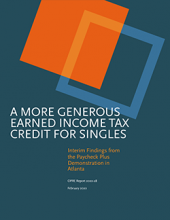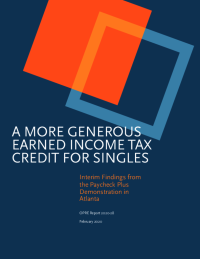A More Generous Earned Income Tax Credit for Singles
Interim Findings from the Paycheck Plus Demonstration in Atlanta

Introduction
 Employment and wages have been rising over the last several years of the recovery from the Great Recession that ended in 2009. But the recent wage increases are not enough to offset decades of stagnating or even falling wages for many groups of low-wage U.S. workers. A central policy question is how to ensure that economic growth is shared more widely and that people who work are not poor. The Earned Income Tax Credit (EITC) is one option. By providing a refundable credit at tax time, it increases incomes and reduces poverty for millions of families. But as currently designed it does little for workers without dependent children, providing a very small credit targeted to those with the lowest earnings.
Employment and wages have been rising over the last several years of the recovery from the Great Recession that ended in 2009. But the recent wage increases are not enough to offset decades of stagnating or even falling wages for many groups of low-wage U.S. workers. A central policy question is how to ensure that economic growth is shared more widely and that people who work are not poor. The Earned Income Tax Credit (EITC) is one option. By providing a refundable credit at tax time, it increases incomes and reduces poverty for millions of families. But as currently designed it does little for workers without dependent children, providing a very small credit targeted to those with the lowest earnings.
Paycheck Plus is a test of a policy that offers a more generous credit to low-income workers without dependent children. The program offers these workers a credit, referred to in the program as a bonus, of up to $2,000 at tax time and is being evaluated using a randomized controlled trial in New York City and Atlanta. Earlier findings from New York City indicate that the program increased after-bonus incomes and led to a small increase in employment rates.
This report presents interim findings from the test in Atlanta. To run the project, MDRC partnered with United Way of Greater Atlanta, which had recently assumed leadership of a large coalition of Volunteer Income Tax Assistance (VITA) programs. Between late 2015 and early 2016, over 4,000 low-income single adults were recruited to take part in the study. Half of them were selected at random to be eligible for the Paycheck Plus bonus for three years, starting with the 2017 tax season.
Primary Research Questions
-
How many adults in the study are eligible for and receive the bonus in each year? How much do they receive on average?
- What are the effects of the offer of the bonus on employment rates, pretax earnings, and income, as measured with net annual earnings (after bonus and taxes)?
- How do the effects of the offer of the bonus vary across different types of individuals, based on gender, level of disadvantage (among men), and earnings in the year before study entry?
Purpose
Paycheck Plus was tested in Atlanta to add to the evidence of how an expanded credit might work in a context different from that of New York City. The study will assess take-up rates of the bonus and its effects on employment, earnings, and income. The goal is to use the findings from both cities to inform consideration — whether federal or state and local — of tax credit amounts for workers without dependent children.
Key Findings and Highlights
-
In each of the first two years, about half of participants with earnings in the eligible range received a bonus. Among those who received bonuses, the average amount received was $1,350. The study targeted a broad group of low-income individuals, who often have variable employment and earnings from year to year, so it was expected that not all study participants would be eligible for a bonus each year. In fact, 68 percent of them were eligible for a bonus in Year 1, meaning that they worked and earned less than $30,000. Just over half of that group applied for and received a bonus in Year 1.
- Paycheck Plus in Atlanta increased after-bonus earnings, or earnings after accounting for taxes and the bonus, in the first year. After-bonus earnings were $10,595 on average for the program group during Year 1, compared with $9,822 for the control group, for a statistically significant increase of $773, or about 8 percent. This increase is estimated using the full sample of study participants, including the roughly 60 percent of individuals who never received a bonus.
- The program did not increase employment rates or earnings through the first two years in Atlanta. The offer of the bonus creates an incentive to work, but its expected effects on earnings are less clear, given the different incentives the bonus creates at different earnings levels, as it phases in and then phases out. The program did not increase employment rates, nor did it have effects, either positive or negative, on average earnings through the first two years.
- Paycheck Plus led to an increase in tax filing rates and large increases in the use of VITA sites for tax preparation. More individuals in the program groups filed their taxes in each year than in the control group, a difference of about 12 percentage points in Year 1. The program also encouraged many more participants to file using the free tax services offered at participating VITA sites. Filing at one of United Way’s VITA sites was not a requirement for bonus receipt, although it was strongly encouraged.
- The program in Atlanta did not affect child support payment rates among noncustodial parents. Paycheck Plus might be expected to affect the payment of child support through the additional income provided by the bonus or through increased work or earnings. Among noncustodial parents in the study sample, no effects on child support payments were observed through Year 2.
Methods
Between October 2015 and April 2016, the project recruited just over 4,000 single adults without dependent children to take part in the study. Individuals were eligible for study enrollment if they were not married, had a valid Social Security number, were not planning to claim a dependent child on their taxes in the subsequent year, were between the ages of 21 and 64, earned less than $30,000 in the prior year, and were not receiving or applying for Supplemental Security Income (SSI) or Social Security Disability Insurance (SSDI). Once eligible individuals agreed to participate, half of them were assigned at random to a group eligible for Paycheck Plus and half were assigned to a group not eligible for the program but still eligible for existing tax credits. Individuals assigned to the Paycheck Plus group were given a brief explanation of the bonus on a take-home sheet. The effects of the Paycheck Plus offer were estimated by comparing the full program group, including those who did not receive bonuses, with the full control group.
Data used for the study include basic demographic and background data collected from all study participants before study entry, unemployment insurance wage records from the Georgia Department of Labor, tax records from the Internal Revenue Service, and child support payment records from the Division of Child Support Services at the Department of Human Services in Georgia.






